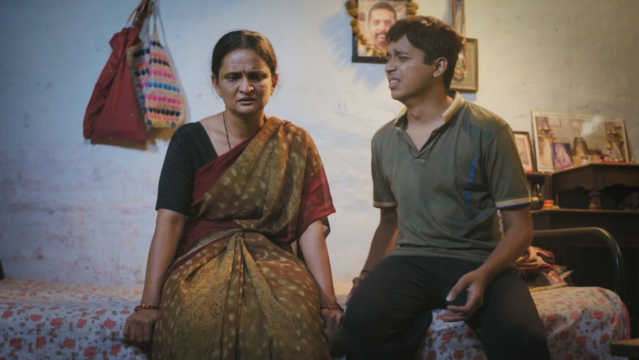
Prateek Rawat
New Delhi, 25 Jan 2019 14:06 IST
Filmmaker Gajendra Ahire’s Sohalla (2019), a tale of domestic strife, love and repentance, benefits from a cast of versatile artistes across the board.

Scripted by National award-winning director Gajendra Ahire, Sohalla follows the three-day journey of a divorced couple as they attempt to get through the juridical proceedings of gaining ownership over a plot of land. Sudden contact after years of estrangement uncover old wounds and bitter memories of a love long lost in the pitfalls of familial and marital crisis.
Carefully oscillating between the conundrum of emotions in the present and the nostalgically charged memories of the shared past through flashbacks, Sohalla brings to the screen a personal drama attempting to elevate itself to social and economic archetypes of existential crisis in a modern Marathi family.
The film deploys an extensive musical palette, scored by Narendra Bhide with lyrics by Ahire himself, to reiterate and reinforce the didactic themes of apologizing (at the right time), the changing forms of love, and the quotidian nature of suffering and forbearance. Despite the evocative lyricism and its melodious pairing with cinematic imagery, the musical score borders on excessive and overtly didactic, which chops away at the impact.
Sohalla benefits from a cast of versatile artistes across the board. Shilpa Tulaskar is exceptional as the protagonist relying on an almost perfect amalgamation of controlled dialogue delivery and subtle expressiveness, bringing naturalism to the everyday nature of the drama. Sachin Pilgaonkar fits in well as the alcoholic and bereft man, albeit with a tendency to tilt into hyper melodrama in situations demanding dramatic tension. Vikram Gokhale and Mohan Joshi dexterously deliver an everyday humanness to the ensemble.
Ahire’s direction and Krishna Soren’s cinematography combine the naturalism of ordinary modern life interspersed with lyrical aesthetic shots of an impressionist view on the natural. Ahire often frames his characters in silent reflection paired with/without a musical score against a natural landscape in attempts to elevate the narrative from the personal to the cosmic. While the film does give a series of poetic shots, they are often presented as isolated idiosyncrasies in the overall framing, thereby creating a slightly uneven and less harmonious overall aesthetic affect.
Combine the above with Prakash Jha’s by-the-book formulaic editing temperament and you get a film with a slightly too glossy and polished look which often contradicts its more brooding reflective temperament. When it comes together, the shots are quite evocative. When it doesn’t, one is often left with a pan of contradicting elements that prick the verisimilitude the film constantly needs and aspires for.
Such odd treatment of colour and style, the affective lapses in the imagery are often palpably visible in regional films across India where either anachronistic or conflicting visual styles pop up in several well-meaning or well-made films. The reasons for this range from budgets to misuse of advanced filmmaking technologies.
Overall, Ahire’s latest feature is a decent effort consistent with the oeuvre of the director where he once again tackles social issues with a humanistic touch and artsy gloss.
Sohalla is a humble addition to this directorial consistency and should be seen to understand the ever-vibrant canvas of regional cinemas in India.
Sohalla was screened at the first Diorama International Film Festival & Market on 19 January 2019. The festival was held at the Siri Fort Auditorium in New Delhi from 14-20 January 2019.
Related topics
DioramaYou might also like

Review Marathi
Samaira review: This well-intentioned travel drama suffers from a dull script
Actor Rishi Deshpande's directorial debut doesn't rise as much as its performances. ...

Review Marathi
Goshta Arjunchi review: Triggering conversations about mental health
Anupam Barve’s short film urges people to talk to their families about what they are going...

Review Marathi
Ekda Kaay Zala review: Sumeet Raghvan impresses in a film that does not use its full potential
Directed by Dr Saleel Kulkarni, the film has a fine act by child artiste Arjun Purnapatre....

